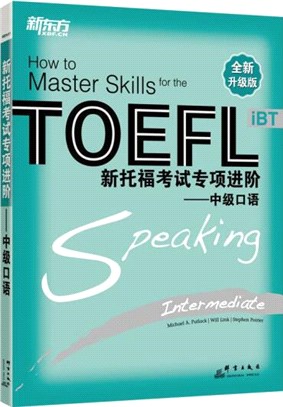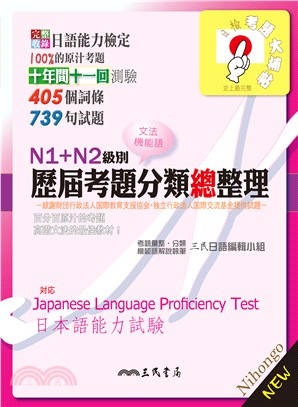商品簡介
本叢書引進自韓國多樂園出版社。該社成立于1977年,在韓國英語教育出版領域始終處于領軍地位。本叢書被韓國眾多學校和培訓機構指定為課堂教材,在托福考生中享有較高聲譽。
作者簡介
Michael A. Putlack:畢業於美國塔夫茨大學,TOEFL、TOEIC、TEPS教育專家,對托福考試有著深入了解,參與編寫《新托福考試專項進階——聽力模擬試題(下)》。
Will Link:畢業於美國佛羅里達大學,文學碩士,對托福考試有著深入了解和研究,參與編寫《新托福考試專項進階——中級聽力》。
Stephen Poirier:畢業於加拿大韋仕敦大學,歷史學碩士,對托福考試的命題與備考有著深入了解,參與編寫《新托福考試專項進階——聽力模擬試題(下)》。
序
Introduction
.
A. Information on the TOEFL® iBT
1. The Format of the TOEFL® iBT
SectionNumber of QuestionsTimingScoreReading• 3~4 Passages - approximately 700 words each - 10 questions per passage54~72 min.30 pointsListening• 2~3 Conversations - 12~25 exchanges each (3 min.) - 5 questions per conversation• 3~4 Lectures - 500~750 words each (4~5 min.) - 6 questions per lecture41~57 min.30 pointsBREAK 10 min. Speaking• 1 Independent Task (preparation: 15 sec. / response: 45 sec.) ① 1 paired choice• 2 Integrated Tasks: Read-Listen-Speak (preparation: 30 sec. / response: 60 sec.) ① 1 campus situation topic - reading: 80~110 words (45 sec.) - conversation: 150~180 words (60~80 sec.) ② 1 academic course topic - reading: 80~110 words (45 sec.) - lecture: 150~220 words (60~90 sec.)• 1 Integrated Task: Listen-Speak (preparation: 20 sec. / response: 60 sec.) ① 1 academic course topic - lecture: 230~280 words (90~120 sec.)17 min.30 pointsWriting• 1 Integrated Task: Read-Listen-Write (20 min.) - reading: 250~300 words (3 min.) - lecture: 250~320 words (2 min.) - a summary of 150~225 words• 1 Independent Task (30 min.) - a minimum 300-word essay50 min.30 points
B. Information on the Speaking Section
The Speaking section of the TOEFL® iBT measures test takers’ English speaking proficiency. This section takes approximately 17 minutes and has four questions. The first question is called Independent Speaking Task, and you will be asked to speak about a familiar topic based on your personal preference. The remaining three questions are Integrated Speaking Tasks, and you will be required to integrate different language skills—listening and speaking or listening, reading, and speaking.
1. Types of Speaking Tasks
[ Independent Task ]
Task 1: Personal Preference
_ This task will ask you to make and defend a personal choice between two possible opinions, actions, or situations. You should justify your choice with reasons and details.
_ You will be given 15 seconds to prepare your answer and 45 seconds to say which of the two options you think is preferable.
[ Integrated Tasks ]
Task 2: Reading & Conversation
_ This task will ask you to respond to a question based on what you have read and heard. You will first read a short passage presenting a campus-related issue and will then listen to a dialogue on the same topic. Then, you will be asked to summarize one speaker’s opinion within the context of the reading passage.
_ You will be given 30 seconds to prepare your answer and 60 seconds to speak on the question. You should be careful not to express your own opinion in your response.
Task 3: Reading & Lecture
_ This task also asks you to respond to a question based on what you have read and heard. You will first read a short passage about an academic subject and will then listen to an excerpt from a lecture on that subject. Then, you will be asked to combine and convey important information from both the reading passage and the lecture.
_ You will be given 30 seconds to prepare your answer and 60 seconds to speak on the question.
Task 4: Lecture
_ In this task, you will first listen to an excerpt from a lecture that explains a term or concept and gives some examples to illustrate it. Then, you will be asked to summarize the lecture and explain how the examples are connected with the overall topic.
_ You will be given 20 seconds to prepare your answer and 60 seconds to respond to the question.
2. Types of Speaking Topics
(1) Personal Preference
_ Questions in Task 1 will be about everyday issues of general interest to test takers. For example, a question may ask about a preference between studying at home and at the library, a preference between living in a dormitory and an off-campus apartment, or a preference between a class with a lot of discussion and one without discussion.
(2) Campus Situations
_ Questions in Task 2 will be about campus-related issues. For example, a question may ask about a university policy, rule, or procedure, future university plans, campus facilities, or the quality of life on campus.
(3) Academic Course Content
_ Questions in Task 3 will be about academic subjects. For example, a question may ask about a life science, a social science, a physical science, or a topic in the humanities like animal domestication or economics.
_ Questions in Task 4 will also be about academic-related topics. For example, a question may ask about a process, a method, a theory, an idea, or a phenomenon of any type in fields like natural science, social science, or psychology.
3. Important Features of Evaluation
(1) Delivery
Delivery means how clear your speech is. In order to get good grades on the speaking tasks, you should speak smoothly and clearly, have good pronunciation, pace yourself naturally, and have natural-sounding intonation patterns.
(2) Language Use
Language use is about the effectiveness of your use of grammar and vocabulary to express your ideas. In order to get good grades on the speaking tasks, you should be able to use both basic and more complex language structures and choose the appropriate words.
(3) Topic Development
Topic development is related to how fully you respond to the question and how coherently you give your ideas. In order to get good grades on the speaking test, you should make sure that the relationship between your ideas and your progression from one idea to the next is clear and easy to follow.
目次
How to Use This Book
PART 1 Independent Speaking
Chapter 1 Personal Experience
Unit 1 People
Unit 2 Places
Unit 3 Events
Unit 4 Obiects
Unit 5 Transportation
Unit 6 Actions
Unit 7 Qualities
Chapter 2 Personal Preference
Unit 8 Education
Unit 9 Welfare
Unit 10 School
Unit 11 Studying
Unit 12 Travel
Unit 13 Money
Unit 14 Computers
PART 2 Integrated Speaking I
Chapter 3 Reading & Conversation
Unit 15 School Facilities
Unit 16 University Construction
Unit 17 School Appointments
Unit 18 School Policies
Unit 19 Bus Routes
Unit 20 Library Construction
Unit 21 Student Affairs
Chapter 4 Reading & Lecture
Unit 22 Biology I
Unit 23 Sociology I
Unit 24 Psychology I
Unit 25 Biology II
Unit 26 Philosophy
Unit 27 Sociology II
Unit 28 Psychology II
PART 3 Integrated Speaking II
Chapter 5 Conversation
Unit 29 Student Life I
Unit 30 Internships
Unit 31 Part-time Jobs
Unit 32 Transportation
Unit 33 Campus Tours
Unit 34 Student Life II
Unit 35 Makeup Exams
Chapter 6 Lecture
Unit 36 Writing 120
Unit 37 Botany 122
Unit38 Education 124
Unit 39 Earth Science
Unit 40 Ecology
Unit 41 Geography
Unit 42 Marketing
Expressions & Collocations
Actual Tests
Answer Book
Chapter 1 Personal Experience
Unit 1 People
Unit 2 Places
Unit 3 Events
Unit 4 Obiects
Unit 5 Transportation
Unit 6 Actions
Unit 7 Qualities
Chapter 2 Personal Preference
Unit 8 Education
Unit 9 Welfare
Unit 10 School
Unit 11 Studying
Unit 12 Travel
Unit 13 Money
Unit 14 Computers
Chapter 3 Reading & Conversation
Unit 15 School Facilities
Unit 16 University Construction
Unit 17 School Appointments
Unit 18 School Policies
Unit 19 Bus Routes
Unit 20 Library Construction
Unit 21 Student Affairs
Chapter 4 Reading & Lecture
Unit 22 Biology I
Unit 23 Sociology I
Unit 24 Psychology I
Unit 25 Biology II
Unit 26 Philosophy
Unit 27 Sociology II
Unit 28 Psychology II
Chapter 5 Conversation
Unit 29 Student Life I
Unit 30 Internships
Unit 31 Part-time Jobs
Unit 32 Transportation
Unit 33 Campus Tours
Unit 34 Student Life II
Unit 35 Makeup Exams
Chapter 6 Lecture
Unit 36 Writing 120
Unit 37 Botany 122
Unit38 Education 124
Unit 39 Earth Science
Unit 40 Ecology
Unit 41 Geography
Unit 42 Marketing
Actual Tests
書摘/試閱
……
主題書展
更多書展今日66折
您曾經瀏覽過的商品
購物須知
大陸出版品因裝訂品質及貨運條件與台灣出版品落差甚大,除封面破損、內頁脫落等較嚴重的狀態,其餘商品將正常出貨。
特別提醒:部分書籍附贈之內容(如音頻mp3或影片dvd等)已無實體光碟提供,需以QR CODE 連結至當地網站註冊“並通過驗證程序”,方可下載使用。
無現貨庫存之簡體書,將向海外調貨:
海外有庫存之書籍,等候約45個工作天;
海外無庫存之書籍,平均作業時間約60個工作天,然不保證確定可調到貨,尚請見諒。
為了保護您的權益,「三民網路書店」提供會員七日商品鑑賞期(收到商品為起始日)。
若要辦理退貨,請在商品鑑賞期內寄回,且商品必須是全新狀態與完整包裝(商品、附件、發票、隨貨贈品等)否則恕不接受退貨。
























